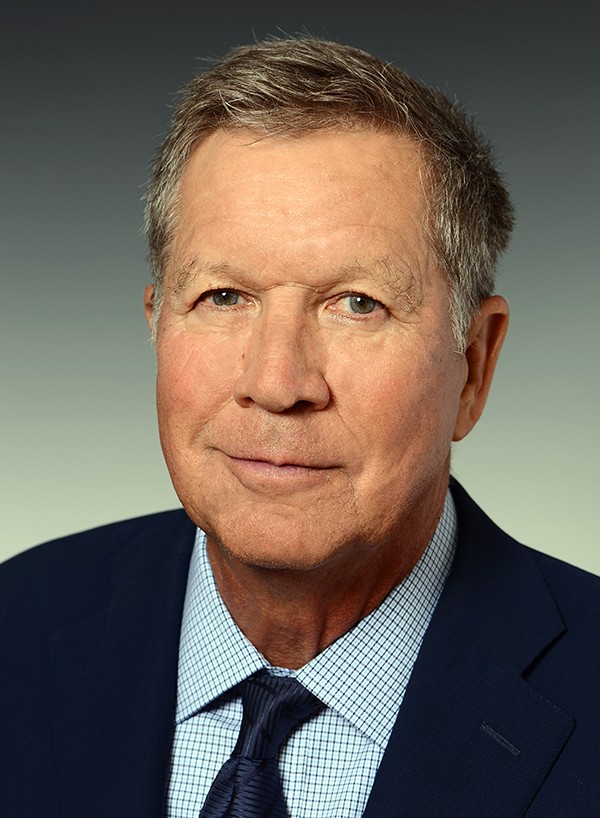Kasich: To solve America’s problems, work together
By Linda Copman
Former Ohio Gov. John Kasich decried the negativity of current politics and urged people across the political spectrum to work together to find solutions during a conversation Feb. 17 with fellow Republican and former U.S. Rep. Susan Molinari.
Part of an effort to encourage bipartisan dialogue and problem-solving, the event was co-hosted by the Institute of Politics and Global Affairs (IOPGA) and the Department of Government in the College of Arts and Sciences. It was moderated by former Rep. Steve Israel, the IOPGA director, and Doug Kriner, its faculty director and the Clinton Rossiter Professor in American Institutions in A&S.
Kasich, who served as a member of Congress from 1983 to 2001 and as governor of Ohio from 2011-19, and Molinari, who represented New York’s 13th and 14th districts in Congress from 1990-97, are both lifelong Republicans who endorsed Joe Biden’s presidential bid.
“Biden is one political figure who is trying to offer hope and optimism, who is likable and good,” Kasich said, in response to a student question during a Q&A following the conversation. “That’s why I supported him.”
Kasich likened the events of Jan. 6, when the U.S. Capitol was breached by protesters, to those of 9/11, when al-Qaeda mounted terrorist attacks on the U.S. He noted that the partisan divide in our country is not new, comparing our current moment to “a roller coaster on the way down. Over the past six or seven years, we’re generating more velocity down,” he said, “which is not just affecting politics, but our whole country.”
Kasich attributed the increasing hostility to two factors: the changing role of religion in society; and a failure to implement what he called “local solutions.”
According to Kasich, religion teaches us to “love our neighbor,” which means that “we care about one another as people.” He believes that when we “other” our neighbors, we forget what we have in common, what he refers to as “our basic integrity.”
Kasich said that by implementing local solutions, we can begin to come together again.
“When we work to attack a common problem,” he said, “we get together and meld our differences. We need to reflect on things that historically have brought our country together.”
Kasich said he was concerned about the failure of partisan politics to generate meaningful solutions. He urged the Biden administration to resist the urge to push through legislation without seeking to build bipartisan support.
“An effort to compromise needs to be made,” he said of Biden’s proposed $1.9 trillion COVID-19 relief package. “We’re just driving past one another at 150 miles per hour.”
Molinari said she and Kasich talked on the phone on the evening of Jan. 6, about the future of the Republican Party. She praised Kasich for modeling how to work across the aisle during his tenure in Congress.
“John Kasich taught us a lot about negotiating while keeping your principles,” she said, recalling that he focused on what “we can accomplish together in a bipartisan way.”
Kasich said his interactions with students make him hopeful about the future. “Our students are smart and committed,” he said. “It’s not all about the money.”
He urged students in the audience to “be a center of purpose and integrity. I’ve never sucked up to anyone,” he said. “Your purpose is the meaning of life. Dream big dreams and don’t let anyone talk you out of them.”
The final question came from Israel, who asked Kasich what gives him hope for the future. Kasich said that, in the end, “ideas always prevail.” He was frank in his prognosis for the Republican Party: “Without them [ideas], this party will die and something else will rise.”
Watch the Kasich event recording here (only current faculty, staff and students can log in to view, until March 20). And check out upcoming events hosted by IOPGA.
Linda Copman is a writer for Alumni Affairs and Development.
Media Contact
Get Cornell news delivered right to your inbox.
Subscribe

